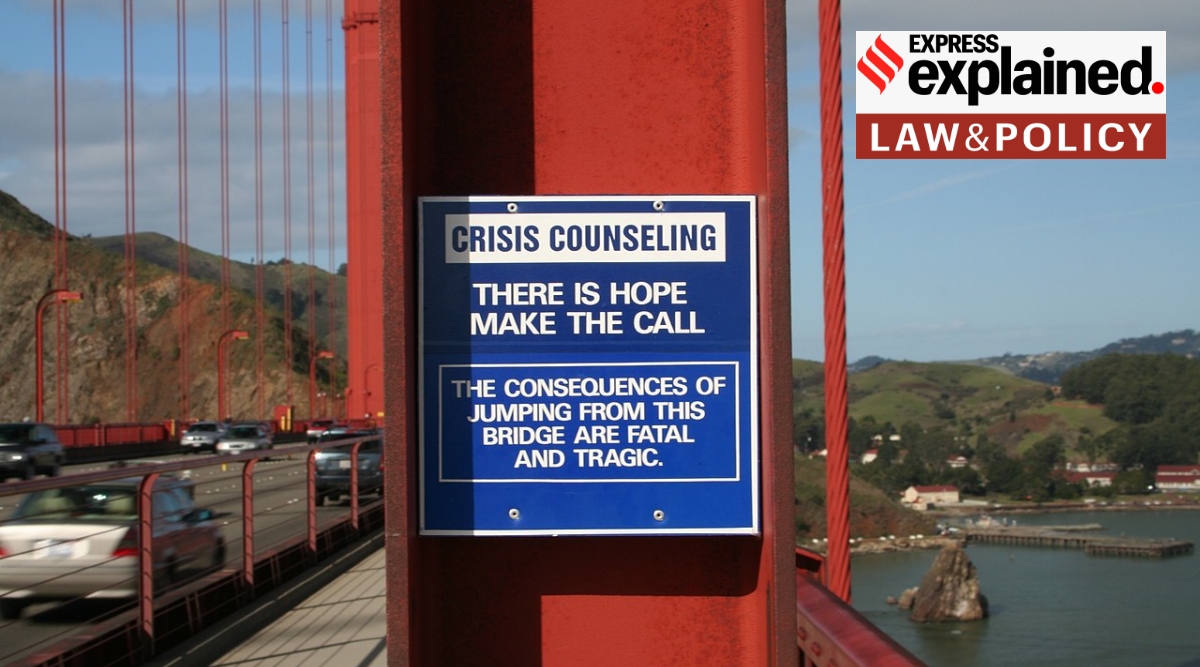Among some of the more problematic provisions of the Indian Penal Code (IPC), 1860, that are absent in the proposed Bharatiya Nyaya Sanhita (BNS) is IPC Section 309, which punishes an attempt to die by suicide. The provision, one of the most archaic in the IPC, has been criticised for long, and it was made mostly redundant by a law of Parliament that came into effect in 2018. However, it remains a part of the Code and is, therefore, liable to be misused.
What does Section 309 of the IPC say?
The Section punishes anyone who tries to kill themselves — usually understood to be the last resort of deeply distressed individuals — with a prison term and/ or a fine. IPC Section 309 says: “Whoever attempts to commit suicide and does any act towards the commission of such offence, shall be punished with simple imprisonment for a term which may extend to one year or with fine, or with both.”

The law, brought by the British in the 19th century, reflected the thinking of the time when killing or attempting to kill oneself was considered a crime against the state as well as against religion.
According to India’s National Crime Records Bureau, the burden of deaths by suicide has increased in India by 7.2 per cent between the years 2020-2021, with a total of 1,64,033 deaths. The NCRB, which collects data from police on recorded suicide cases, also reported that every year more than 1 lakh people die by suicide in India.
So how has the provision changed since the Code was enacted?
Back in 1971, the Law Commission in its 42nd Report recommended the repeal of IPC Section 309.
In furtherance of this objective, the Janata Party government of Prime Minister Morarji Desai brought The IPC (Amendment) Bill, 1978. The Bill was introduced and passed in Rajya Sabha, but before it could be cleared by Lok Sabha, Parliament was dissolved, and the Bill lapsed.
In ‘Gian Kaur vs. the State of Punjab (1996), a five-judge Bench of the Supreme Court upheld the constitutional validity of IPC Section 309.
However, in 2008, the Law Commission, in its 210th Report, said that an attempt to commit suicide needed medical and psychiatric care and not punishment.
Best of ExplainedExplained: Amid the Israel-Palestine conflict, Gaza's 100-year history of warEconomics Nobel 2023: How marriage, parenthood impact women in the workforceWhy Gandhi opposed a Jewish nation-state in PalestineClick here for more
In March 2011, the Supreme Court also recommended to Parliament that it should consider deleting this section from the IPC.
However, concrete action could finally come with the passage of The Mental Healthcare Bill (MHCA) of 2017, which came into force in 2018. The law made it clear that Section 309 IPC could be used to punish attempted suicide only as an exception.
Section 115(1) of The MHCA says: “Notwithstanding anything contained in section 309 of the Indian Penal Code any person who attempts to commit suicide shall be presumed, unless proved otherwise, to have severe stress and shall not be tried and punished under the said Code.”
Section 115(2) of The MHCA states that it shall be the duty of the “appropriate government” to “provide care, treatment, and rehabilitation to a person, having severe stress and who attempted to commit suicide, to reduce the risk of recurrence of attempt to commit suicide.”
So how effective a deterrent against the use of IPC Section 309 was this law?
The restrictions on the use of Section 309 under the provisions of the MHCA were not enough because they only created a directive under another Act, while the offence itself was allowed to stay alive in the IPC. Thus, even after the enactment of the MHCA, there have been reports about the alleged misuse of this section.
On May 20, 2020, an inmate at Gurgaon’s Bhondsi jail who allegedly tried to kill himself with a pair of scissors, was reported to have been booked under Section 309 IPC. Again, on June 8, 2020, a runaway couple allegedly attempted suicide at Ashok Nagar police station in Bengaluru by consuming hair dye. Local media reported that they were booked under IPC Section 309.
Also Read | Expert Explains: What does the proposed legislation to overhaul criminal justice system mean?
Several senior police officers have said that on many occasions, there is a lack of awareness among officers at the level of the police station about the relatively new MHCA, and they simply go by the IPC. However, the charge under Section 309 is often dropped subsequently, following consultations with senior officers, Harssh Poddar, who was then the Superintendent of Police, Beed, Maharashtra, had told The Indian Express in 2020.
Does the removal of the section in the proposed BNS finally close this chapter, then?
Although the new Bill seemingly removes this section from the statute books, it doesn’t entirely decriminalise the offence of attempting to die by suicide.
Thus, Section 224 of the proposed BNS states: “Whoever attempts to commit suicide with the intent to compel or restrain any public servant from discharging his official duty shall be punished with simple imprisonment for a term which may extend to one year or with fine or with both or with community service.”
In Opinion | Faizan Mustafa writes: New penal code falls short of its laudable objectives
This essentially introduces a twist in the provision — an attempt to commit suicide remains a punishable offence if it is made to stop a public servant from acting. An example could be of a protester who attempts self-immolation to stop police from arresting other protesters.
Also, Section 224 of the proposed BNS allows community service as punishment, which is not available in IPC Section 309.
What other provisions in the proposed new laws deal with issues related to suicide and mental health?
There are a couple of sections in the proposed BNS that punish the abetment of suicide.
Section 106 says: “If any person commits suicide, whoever abets the commission of such suicide, shall be punished with imprisonment… [up] to ten years and shall also be liable to fine.”
And Section 105 states: “If any person under eighteen years of age, any person with mental illness, any delirious person or any person in a state of intoxication, commits suicide, whoever abets the commission of such suicide, shall be punished with death or imprisonment for life, or imprisonment for a term not exceeding ten years, and shall also be liable to fine.”
Most Read 1Amitabh Bachchan wipes tears as Chiranjeevi, Vidya Balan, Vicky Kaushal celebrate his birthday on KBC: ‘Aur kitna rulayenge?’ 2Haryana IAS officer Vijay Dahiya held in graft case 3Akshay Kumar explains the reason behind not extensively promoting Mission Raniganj: ‘I promoted Selfie a lot, it didn’t work’ 4Aamir Khan says he and daughter Ira Khan have benefitted from years of therapy: ‘There’s no shame in seeking professional help’ 5Jawan box office: From 3.5 cr footfalls to biggest recovery ever for Hindi film, all major records shattered by Shah Rukh Khan’s blockbuster
The Bharatiya Nagarik Suraksha Sanhita, 2023, which seeks to replace the Code of Criminal Procedure, also has a provision on suicide, but not as an offence. Section 194 of the proposed BNSS deals with the police’s ability to inquire about and report on suicide, etc.
Sections 367–369 of the proposed BNSS specify the criminal procedure in cases where the accused is a person with mental illness, the mentally ill person is being tried before the court, and the release of persons with mental illness pending investigation or trial.
Also ReadWhen can a bill be designated as a ‘money bill’: SC to hear challengeAge of consent increased from 13 to 16 years in Japan: Here's whyBihar caste survey data out: Why it was legally challenged — and why the …302 is not murder, 420 is not cheating: How IPC Section numbers will chan…
Section 376 of the proposed BNSS lays down the procedure where a prisoner with mental illness is reported as capable of making his defence; Section 377 deals with the procedure by which those detained with mental illness are declared fit to be released; and Section 378 deals with the delivery of persons with mental liabilities to a relative or friend for their care.
© The Indian Express Pvt Ltd



